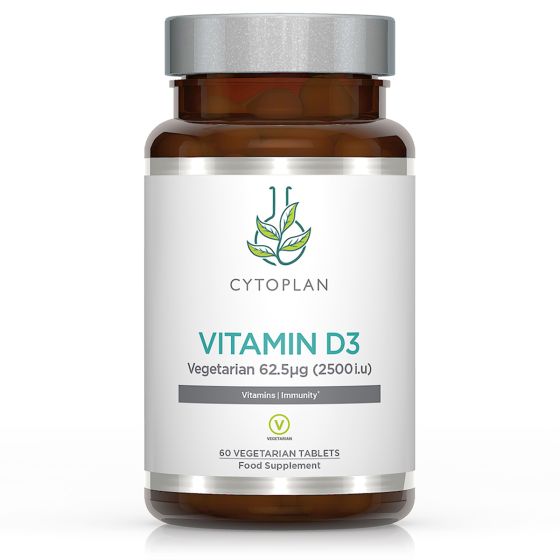- Provides 62.5μg (2,500i.u.) of vitamin D3 per tablet
- Tiny tablets, making them easier to swallow
- Suitable for vegetarians
- Not suitable for vegans
- Safe and effective for daily use
This product is a high potency vitamin D3 supplement suitable for vegetarians.
- A high potency, one-a-day formula, providing the level of vitamin D often recommended by healthcare professionals
- One tablet provides 62.5µg (2,500i.u) of vitamin D3 (cholecalciferol) at 1250% of the NRV
- Vitamin D3 is more efficacious at raising serum 25(OH)D concentrations and therefore calcitriol than vitamin D2. Vitamin D3 is therefore the preferred choice for supplementation (1)
- With the evidence of widespread deficiency within the UK population, it is essential that the most efficacious source of vitamin D is consumed through supplementation (2,3)
- Those at particular risk of vitamin D deficiency are the elderly (65 years+), those who rarely get outdoors (lack of sunshine) and people with dark skin. (Children under five are also at risk and for this age group we have a liquid vitamin D3 product – Vitamin D3 Drops code 3323)
Vitamin D has been shown to contribute to:
- the absorption and utilisation of calcium and phosphorus
- normal blood calcium levels
- the maintenance of bones and teeth
- the maintenance of normal muscle function
- the normal function of the immune system
Vitamin D also:
- has a role in the process of cell division
- is needed for normal growth and development of bone in children
- helps to reduce the risk of falling associated with postural instability and muscle weakness. Falling is a risk factor for bone fractures among men and women 60 years of age and older
Please note:
This supplement contains 62.5µg (2500iu) of vitamin D per tablet. If taking other supplements containing vitamin D, please check your total daily intake. If it is 125µg (5000iu) or more per day, for more than two to four months, you should have your vitamin D levels checked regularly. An adequate blood level is considered to be above 50nmol/litre; the scientific literature suggests that a higher level than this is optimal. However, levels above 250nmol/litre are not advised and in this case, measures should be taken to lower levels. Please note some laboratories use different units i.e. ng/ml rather than nmol/litre quoted here. In this case an adequate blood level is considered to be 20ng/ml (again the optimal range is higher than this). For more information on vitamin D you may be interested in www.grassrootshealth.net
References:
(1). Laura Tripkovic, Helen Lambert, Kathryn Hart, Colin P Smith, Giselda Bucca, Simon Penson, Gemma Chope, Elina Hyppönen, Jacqueline Berry, Reinhold Vieth, and Susan Lanham-New. (2012). “Comparison of vitamin D2 and vitamin D3 supplementation in raising serum 25-hydroxyvitamin D status: a systematic review and meta-analysis”. The American Journal of Clinicl Nutrition. 95(6): pp1357–1364.
(2) Elina Hyppönen, Chris Power. (2007). “Hypovitaminosis D in British Adults at Age 45 Y: Nationwide Cohort Study of Dietary and Lifestyle Predictors”. The American Journal of Clinical Nutrition. 95(6): pp1357–1364.
(3) Michael F Holick, Tai C Chen. (2008). “Vitamin D Deficiency: A Worldwide Problem With Health Consequences”. American Journal of Clinical Nutrition. 87(4):pp1080S-6S
| Active Nutrient | Strength | %NRV* |
| Vitamin D3 (cholecalciferol) | 62.5μg (2500 i.u.) | 1250 |
|
+NRV = Nutritional Reference Value * Indicates no NRV |
||
Vitamin D3 preparation (maltodextrin ,cornstarch, sucrose, cholecalciferol), bulking gent (dibasic calcium phosphate dihydrate, cellulose), anti-caking agent (stearic acid).
Take 1 tablet per day as a food supplement or as directed by a practitioner.
Vegetarians.
None.
Maltodextrin, corn starch, sucrose, dibasic calcium phosphate dihydrate, cellulose, stearic acid.
GMO, wheat, soy, dairy, flavourings and colourings.
Store in a cool, dry place.




